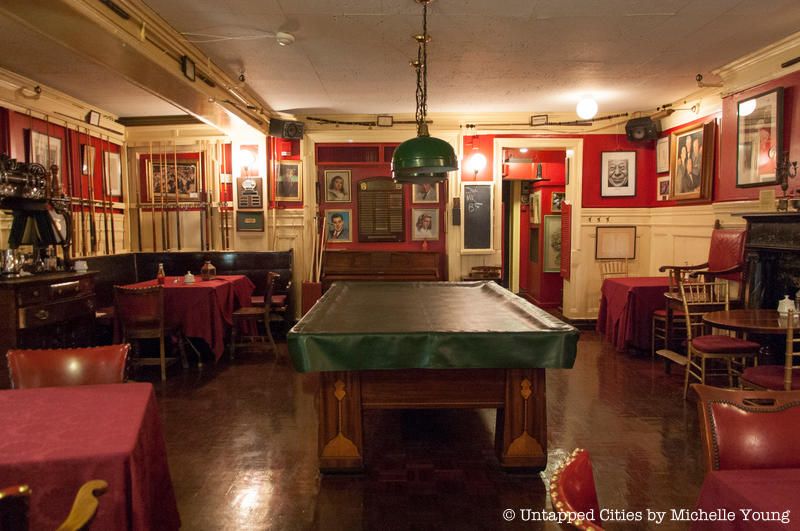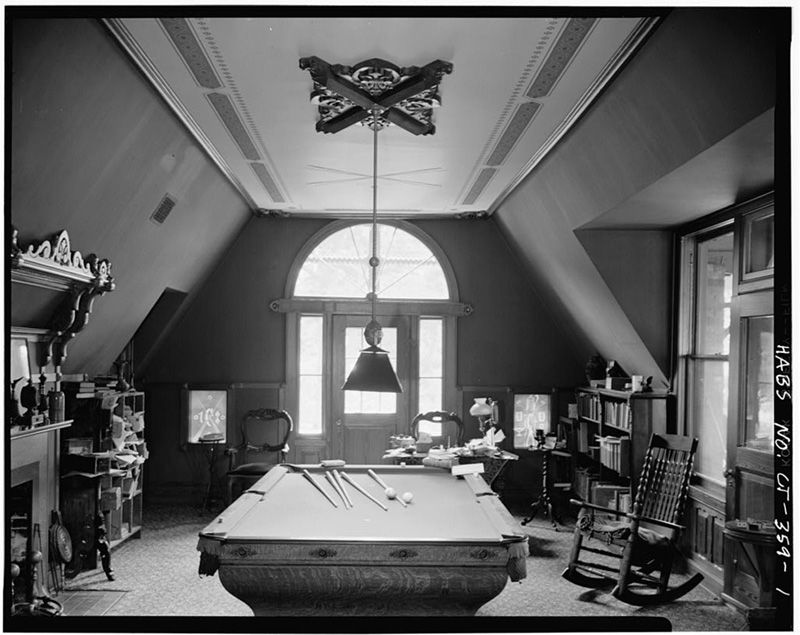

There are many treasures in the members-only Players Club in Gramercy Park, whose membership consists of theater industry folks and enthusiasts. One of them is a pool cue used by writer Mark Twain (aka Samuel Longhorne Clemens), one of its most famous members who by all accounts, lived it up at the club.

Twain was present at the founding lunch at Delmonico’s where the club was inaugurated, an event reported with gusto in the New York Times on April 18, 1888, as one of the “pleasanter lunches ever given” at the restaurant. (General William Tecumseh Sherman was also present, himself a big fan of the theater). He was also an avid attendee of dinners hosted at the club itself, according to Lost Past Remembered. Twain signed a menu from January 3rd, 1906 where each dish had an accompanying clever quote.
Mark Twain was also known, inside and outside of the club, as an avid billiards player. The famous billiard champion William Hoppe described Twain as “the most enthusiastic billiard fan” he ever knew. According to the website of the Amsterdam Billiards in New York City, Twain was more than enthusiastic, he was borderline obsessed: “Twain stipulated anywhere he lived, there must be a proper billiards table. As he grew older, billiards became an obsession for him; he was a recluse who would only accept callers if they were willing to shoot pool with him. Once, when his house caught fire, he was so invested in his game of billiards that he barely even noticed the flames.” Twain himself in a public speech declared, “The game of billiards has destroyed my naturally sweet disposition.”

The Library of Congress has a photograph of Twain standing over a billiard table holding a cue stick at Stormfield, the house in Redding, Connecticut where he lived from 1908 to his death in 1910. Twain’s house in Hartford, Connecticut (where he lived from 1874 to 1891), designed by Edward Tuckerman Potter and Alfred H. Thorp, also had a dedicated billiard room.
The writer Albert Bigelow Paine wrote in The Boys Life of Mark Twain:
He was not an even-tempered player. When the game went steadily against him he was likely to become critical, even fault-finding, in his remarks. Then presently he would be seized with remorse and become over-gentle and attentive, placing the balls as I knocked them into the pockets, hurrying to render this service. I wished he would not do it. It distressed me that he should humble himself. I was willing that he should lose his temper, that he should be even harsh if he felt so inclined–his age, his position, his genius gave him special privileges. Yet I am glad, as I remember it now, that the other side revealed itself, for it completes the sum of his humanity. Once in a burst of exasperation he made such an onslaught on the balls that he landed a couple of them on the floor. I gathered them up and we went on playing as if nothing had happened, only he was very gentle and sweet, like a summer meadow when the storm has passed by. Presently he said:
“This is a most amusing game. When you play badly it amuses me, and when I play badly and lose my temper it certainly must amuse you.”
It is therefore not surprising that The Players would also have a billiard table and to this day, Twain’s pool cue hangs above a portrait of the writer by Gordon Stevenson.
Next, check out the Top 10 Secrets of the Players Club in Gramercy Park.


